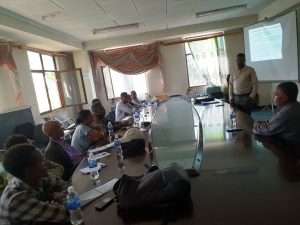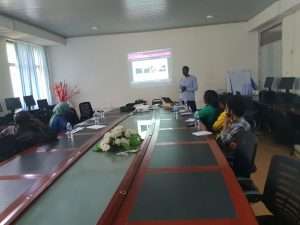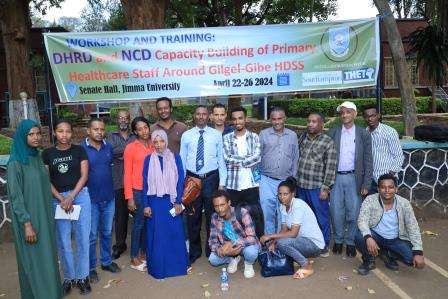 Jimma University in collaboration with the University of Southampton organized a sensitization workshop and capacity building training on DHRD and NCDs. A one-day workshop was conducted at Jimma University on 22 April 2024 with stakeholders to create a common understanding of quality health data for evidence-based health practices. The participants were from local primary healthcare institutions and Jimma Zone Health Office, including four health centers (Bala-wajo, Asendabo, Dimtu, and Deneba), and two primary hospitals (Dimtu and Nada), which are found around the Gilgel-Gibe Health and Demographic Surveillance System (GGHDSS) site.
Jimma University in collaboration with the University of Southampton organized a sensitization workshop and capacity building training on DHRD and NCDs. A one-day workshop was conducted at Jimma University on 22 April 2024 with stakeholders to create a common understanding of quality health data for evidence-based health practices. The participants were from local primary healthcare institutions and Jimma Zone Health Office, including four health centers (Bala-wajo, Asendabo, Dimtu, and Deneba), and two primary hospitals (Dimtu and Nada), which are found around the Gilgel-Gibe Health and Demographic Surveillance System (GGHDSS) site.
The workshop featured presentations, at the opening session, Dr. Lelisa Sena, leader of the Digital Health Research and Capacity Building Project (DHRD), explained that the objective of the workshop was to create a common understanding of digital health and non-communicable diseases (NCDs) capacity-building that is being implemented around the Gilgel-Gibe Health and Demographic Surveillance System (GGHDSS) site.
He also mentioned that the work on NCDs was started in 1998 in eight health centers of Jimma Zone to train nurses to treat NCDs in primary healthcare. The pilot was successful and it was scaled up and adapted at the national level. As a result, the treatment of chronic illness was decentralized to health centers, which substantially increased the accessibility of patients to get treatment timely.
He further asserted that the DHRD capacity building was initiated following an MoU signed between JU and UoS in November 2020 to collaborate in the academy, research, and joint application for grants, to list some. The capacity building focuses on linking the GGHDSS data that has been generated over the last nearly two decades) with the local health facilities’ data to improve the health of the population using real-time quality data for evidence-based health practices.
Dr. Tadesse Dukessa, lead of the non-communicable diseases (NCDs), discussed the Current Status of NCDs and the need for in-service training. In particular, he emphasized the importance of early identification and treatment of NCD patients at the primary healthcare level before the disease progresses and exposes clients to unbearable economic and life costs.
In his second presentation, Dr. Lelisa discussed the Health and Demographic Surveillance System (HDSS), the Key features of HDSS, The importance of HDSS data, and Why link Gilgel-gibe GHDSS data with the data of local health services. Finally, Dr. Yohannes Kebede, head of the GGHDSS, presented an overview of the DHRD Capacity Building Project and the activities performed.
 In a separate session, the training of health professionals who manage NCD patients at the respective health institution continued for four days. The NCD training was facilitated by senior physicians: Dr. Tadesse Dukessa, Dr. Kedir Negeso, and Dr. Ermias Habte. The training covered: Hypertension, Diabetes, and Monitoring and evaluation of diabetic services
In a separate session, the training of health professionals who manage NCD patients at the respective health institution continued for four days. The NCD training was facilitated by senior physicians: Dr. Tadesse Dukessa, Dr. Kedir Negeso, and Dr. Ermias Habte. The training covered: Hypertension, Diabetes, and Monitoring and evaluation of diabetic services 

